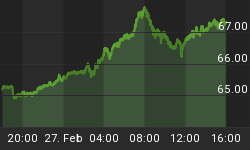Deflation: Are We There Yet?
Bud: In our last conversation, you said that we're heading into a deflation cycle and suggested that maybe it could last for many years. But you also said that perhaps it has not started yet. Can you elaborate?
Glenn: No, we haven't gone through the real deflation yet. I think we may have some early signs of it. Because of what the Fed has done, the trend is not actually finished, and international countries that are still in or just finishing their boom phase, as an aggregate whole, we haven't reached the peak of that point where deflation can begin on a worldwide basis.
Bud: What you're saying is when it does happen the Federal Reserve will basically run out of bullets, the real deflation is going to happen, and the stock market is going to crash again.
Glenn: It doesn't mean the stock market is going to crash. It's dependent on how it takes place. The value of each dollar will be worth more. How that will impact the stock market is hard to say and a little complicated.
The wave structure definitely indicates the stock market is either going to be going sideways or down in the next two, three or four years. That doesn't mean we're going to crash. I definitely do not believe in any kind of crash scenario.
We had the crash in 2008. That's probably the worst we're going to see, and it's not going to get any worse than that. We will have a downtrend, which should begin sometime. It may have already started as of June and July where the most recent high took place.
From that point forward, we're probably going to be going sideways or down in the stock market. Just because you have deflation doesn't mean you get a stock market crash.
Bud: I see. The commodity market will end up crashing because they are so pegged to the dollar.
Glenn: The gold market should go through a very large, dramatic downturn for many reasons. Any time something is too popular, it always eventually becomes less popular.
Gold is pretty popular at this point. It has been the talk of the town for a long time. It has gone up from $250 to $1,600. That's quite an explosive move. Just a normal reaction would be down to $1,000. That would shock a lot of people.
Based on wave structures, it would be more like $500 or $600 over so many years. It's hard to say the timeframe right now, but it could be within five years. We could drop down to $500 in the gold market.
That's a pretty significant drop in the value of gold, in relation to the value of the dollar. That suggests the dollar is going to go up quite a bit. As a result, gold is going to change its value relative to the dollar. Gold is not really moving around in value much. It's the dollar that's changing its value. That reflects in the price of gold.
It's an unfortunate part of a paper money system that most people don't quite understand. When you look at a dollar, you see a number one. You look at a $100 bill and you see 100.
You think that's a stable amount and everything around you is changing, but what's really changing is the value of that paper you have in your hand. The numbers are relatively meaningless. It's how it relates to other commodities and products that decides how much the dollar is actually worth.
It's sort of sad, but that's just the way it works. If you take an ounce of gold, it can't be created. It's an indestructible element, unlike almost anything else in nature. It's beautiful, has an incredible industrial value and can always be reclaimed, almost like water.
The same amount of gold has existed on the earth for as long as man has been around, but the amount of dollars and paper has changed all over the map. That's what causes the change in the value of gold as it relates to the number of dollars in circulation. It's not gold that's changing. It's the dollar that's changing.
Bud: You said that we will have another letdown in the market. Based on wave structure, will we test the March 2009 low and break it?
Glenn: It's indeterminable right now. The probabilities are pretty high that we will not break the 2009 low. There's a pretty good chance it's going to hold for the rest of my life. There's a slight chance we could break it.
Generally speaking, the low in 2009 is about as bad as it's going to get and as far down as the stock market should go for the rest of my life, give or take a few percentage points.















